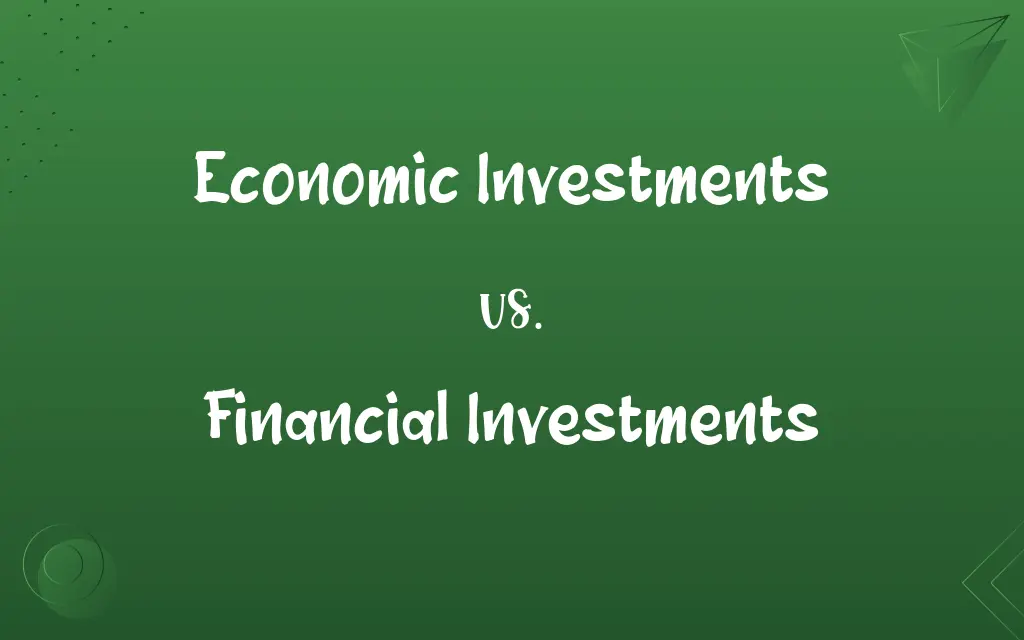Economic Investments vs. Financial Investments: Know the Difference

By Shumaila Saeed & Hifza Nasir || Published on March 3, 2024
Economic investments involve acquiring physical assets for production growth, while financial investments focus on purchasing financial assets for profit through dividends or interest.

Key Differences
Economic investments refer to the purchase of physical assets, like machinery, buildings, or technology, aimed at increasing a company's production capacity or efficiency. These investments are fundamental to business expansion and economic growth, focusing on long-term value creation through increased productivity. In contrast, financial investments involve buying financial assets such as stocks, bonds, or mutual funds, with the primary goal of earning income or capital gains. Investors in financial markets seek to maximize returns through asset appreciation, dividends, or interest, often within shorter timeframes than economic investments.
Hifza Nasir
Mar 03, 2024
Economic investments directly contribute to the productive capacity of an economy, financial investments are more about asset allocation and portfolio management, aiming to increase wealth through market participation. Economic investments are critical for job creation and technological advancement, laying the groundwork for sustainable economic development. Financial investments, however, provide liquidity to the markets and enable companies to raise capital for economic investments, illustrating a symbiotic relationship between the two.
Shumaila Saeed
Mar 03, 2024
The risk profiles of economic and financial investments also differ significantly. Economic investments carry the risk of obsolescence and physical depreciation, requiring continuous maintenance and upgrades. Financial investments are subject to market volatility and the risk of financial loss due to economic downturns or poor asset performance. Despite these risks, both investment types are essential for a balanced and diversified investment strategy, offering different benefits and challenges to investors.
Hifza Nasir
Mar 03, 2024
The decision between economic and financial investments depends on the investor's objectives, risk tolerance, and investment horizon. Businesses and governments typically focus on economic investments to stimulate growth and innovation, while individual and institutional investors might lean towards financial investments for wealth accumulation and income generation. Understanding the distinctions between these investment types is crucial for strategic planning and achieving long-term financial goals.
Shumaila Saeed
Mar 03, 2024
Comparison Chart
Definition
Acquiring physical assets to increase production capacity.
Purchasing financial assets for income or capital gains.
Hifza Nasir
Mar 03, 2024
ADVERTISEMENT
Objective
Enhance productive capacity and efficiency.
Maximize returns through appreciation, dividends, or interest.
Shumaila Saeed
Mar 03, 2024
Contribution
Directly contributes to economic growth and job creation.
Provides market liquidity, enables capital raising.
Shumaila Saeed
Mar 03, 2024
Time Horizon
Long-term, focusing on sustained growth and productivity.
Can be short-term or long-term, depending on strategy.
Shumaila Saeed
Mar 03, 2024
Risk Profile
Risks of obsolescence, physical depreciation.
Market volatility, financial loss risk.
Dua Fatima
Mar 03, 2024
ADVERTISEMENT
Primary Investors
Businesses, governments.
Individual and institutional investors.
Shumaila Saeed
Mar 03, 2024
Benefits
Sustainable development, technological advancement.
Wealth accumulation, income generation.
Shumaila Saeed
Mar 03, 2024
Challenges
Requires significant upfront capital, maintenance costs.
Subject to market risks, requires financial knowledge.
Hifza Nasir
Mar 03, 2024
Economic Investments and Financial Investments Definitions
Economic Investments
Acquiring technology to enhance product quality.
An automotive company invests in advanced engineering software to improve vehicle design.
Shumaila Saeed
Feb 29, 2024
Financial Investments
Trading commodities for speculative profits.
A trader invests in gold futures, betting on price increases due to market instability.
Shumaila Saeed
Feb 29, 2024
ADVERTISEMENT
Economic Investments
Purchasing machinery to increase factory output.
A manufacturing firm invests in new robots to boost production efficiency.
Hifza Nasir
Feb 29, 2024
Financial Investments
Buying stocks to earn dividends and capital gains.
An investor purchases shares in a renewable energy company, anticipating growth.
Shumaila Saeed
Feb 29, 2024
Economic Investments
Building new facilities for expanded operations.
A tech company constructs a new R&D center to innovate and develop new products.
Hifza Nasir
Feb 29, 2024
Financial Investments
Investing in bonds for regular interest income.
A retiree buys government bonds to secure a steady income stream.
Hifza Nasir
Feb 29, 2024
Economic Investments
Investing in research and development for future growth.
A pharmaceutical company funds extensive drug research to find new treatments.
Shumaila Saeed
Feb 29, 2024
Financial Investments
Placing money in mutual funds for diversified exposure.
A new investor uses mutual funds to gain access to a broad range of assets.
Hifza Nasir
Feb 29, 2024
Economic Investments
Expansion of business operations into new markets.
A retail chain opens new stores in emerging markets to increase its global presence.
Shumaila Saeed
Feb 29, 2024
Financial Investments
Participating in real estate investment trusts (REITs) for rental income.
An individual invests in a REIT specializing in commercial properties.
Hifza Nasir
Feb 29, 2024
Repeatedly Asked Queries
Which is riskier, economic or financial investments?
While both have risks, financial investments are more exposed to market volatility, whereas economic investments face obsolescence and physical depreciation.
Hifza Nasir
Mar 03, 2024
What distinguishes economic investments from financial investments?
Economic investments focus on acquiring physical assets to boost production, while financial investments target financial assets for profit.
Hifza Nasir
Mar 03, 2024
How do economic investments contribute to the economy?
They directly increase production capacity, create jobs, and foster technological advancements, driving sustainable economic growth.
Shumaila Saeed
Mar 03, 2024
Why are financial investments important?
They provide liquidity to financial markets, enable capital raising for businesses, and offer individuals and institutions opportunities for income and wealth accumulation.
Shumaila Saeed
Mar 03, 2024
Can financial investments drive economic growth?
Indirectly, by providing the capital necessary for businesses to make economic investments, thereby supporting overall economic development.
Hifza Nasir
Mar 03, 2024
Can an investment be both economic and financial?
Some investments might blur the lines, like a corporate bond used to finance new production facilities, serving both economic growth and financial income objectives.
Shumaila Saeed
Mar 03, 2024
Do economic investments always require large capital outlays?
Typically, yes, as they involve substantial physical assets and infrastructure development, demanding significant upfront and ongoing investment.
Dua Fatima
Mar 03, 2024
What role do governments play in economic investments?
Governments often make economic investments in infrastructure, education, and technology to stimulate growth, improve productivity, and enhance societal welfare.
Shumaila Saeed
Mar 03, 2024
How should an investor choose between economic and financial investments?
The choice depends on the investor’s goals, risk tolerance, and whether they prioritize immediate income, long-term growth, or contributing to economic development.
Shumaila Saeed
Mar 03, 2024
How do market conditions affect these types of investments?
Economic investments are more influenced by long-term market trends and economic policies, while financial investments can fluctuate widely with market sentiment and economic cycles.
Dua Fatima
Mar 03, 2024
Share this page
Link for your blog / website
HTML
Link to share via messenger
About Author
Written by
Shumaila SaeedShumaila Saeed, an expert content creator with 6 years of experience, specializes in distilling complex topics into easily digestible comparisons, shining a light on the nuances that both inform and educate readers with clarity and accuracy.
Co-written by
Hifza Nasir








































































